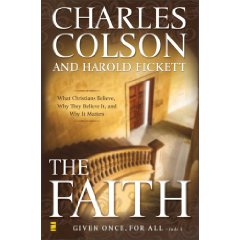This has been my favorite chapter so far. The belief that humans are “basically good” was one I held for most of my Christian life, unwittingly siding with culture against the Bible. I’ll hold on to this chapter to recommend to others in the future.
Summary: The root cause of human pain is sin, a chosen human response to free will. Attempts to mitigate our responsibility for sin only perpetuate destructive behavior. Colson draws heavily on his own experiences with prisoners in showing the reality of objective sinfulness.
When I nodded my head:
“The most terrifying truth I have discovered in life is the banality of evil; the most ordinary people are capable of the most horrific sin; it is in us all.” (p. 76)
When I furrowed my brow:
Not really furrow-inducing, but there were a few times when I felt a generational disconnect with Colson. Which, I suppose, comes from us being 50 years apart in age.
Favorite quote:
“We certainly want the blessings of free will, even if we don’t like teh consequences of our evil choices, which we often perversely blame God for. But of course we can’t have it both ways.” (p. 74)
